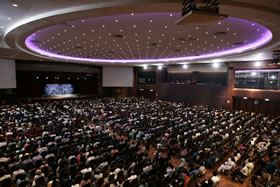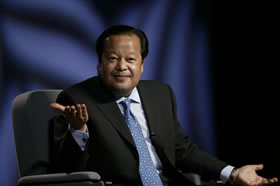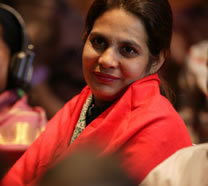sábado, 31 de enero de 2015
miércoles, 28 de enero de 2015
martes, 27 de enero de 2015
lunes, 26 de enero de 2015
domingo, 25 de enero de 2015
sábado, 24 de enero de 2015
True Gratitude
 In our lives, we cannot get rid of all the bad. Your bad might be someone else's good. Good and bad are relative, but there is one good that is not. There is one right that is above all the rights and wrongs. It is not what happens in this world—all the waves that come. Your reality is the breath that comes into you. Your reality is that you are alive.
In our lives, we cannot get rid of all the bad. Your bad might be someone else's good. Good and bad are relative, but there is one good that is not. There is one right that is above all the rights and wrongs. It is not what happens in this world—all the waves that come. Your reality is the breath that comes into you. Your reality is that you are alive.
Every day, we have an opportunity to learn how to really be alive. The world's definition is: You do this, you do this, you do this. That's not being alive.
People say, "You can’t live in enjoyment. You have to accept what the world has to give, and that’s it." That's one extreme. They say, "Do what you are supposed to do, what you are told to do—these are your responsibilities, your duties." The other extreme is, "Forget about it all—go live in the Himalayas, shave off your hair, and just retire. That’s it."
 No one says, "It doesn’t matter." The person who has left everything and gone to the Himalayas wants to be happy. And the person who is in the middle of this world doing whatever he does wants to be happy. Happiness and the desire for happiness exist for both.
No one says, "It doesn’t matter." The person who has left everything and gone to the Himalayas wants to be happy. And the person who is in the middle of this world doing whatever he does wants to be happy. Happiness and the desire for happiness exist for both.
There are so many interpretations, and they are all based on the premise that you are confused. You cannot afford to be confused. There needs to be a distinct clarity in every step you take. You are not the master of this existence; you are an apprentice.
Be an apprentice. Learn something from life every single day because life is giving you the opportunity to learn. The value of each breath is being taught. The value of this existence is being taught. How important it is for you to be in peace is being taught.
As an apprentice, you learn and learn, and you do your best every day. Every day, you make that effort. Every day, you try to be a little more conscious. As an apprentice, you're not there to pass judgment: "Today was a bad day!" It was a day.
 Learn that, and when you begin to understand, the most amazing thing takes place. A real gratitude emanates from the heart, not from concepts. There's a gratitude that doesn't get covered by "please" and "thank you" because it's so real. It moves me. It involves me—not a society or a concept—but me. It evokes my hunger, my thirst, my reality, my existence. When I feel that true gratitude, there are no words for it.
Learn that, and when you begin to understand, the most amazing thing takes place. A real gratitude emanates from the heart, not from concepts. There's a gratitude that doesn't get covered by "please" and "thank you" because it's so real. It moves me. It involves me—not a society or a concept—but me. It evokes my hunger, my thirst, my reality, my existence. When I feel that true gratitude, there are no words for it.
You will benefit from that consciousness. You will benefit from that realization. And yes, it is possible. You can have that joy. You can have peace in your life. It is possible amidst all the problems in the world.
viernes, 23 de enero de 2015
miércoles, 21 de enero de 2015
lunes, 19 de enero de 2015
domingo, 18 de enero de 2015
sábado, 17 de enero de 2015
viernes, 16 de enero de 2015
That Awe Thing

This article is also available in: Italian
“When I go to work,” says Flo, who recently completed the 10-week Peace Education Program (PEP), “I wake up really early and sit by the trash bin to wait for the bus. I’m down here looking up at the sky, and I’m happy. I’m content. That awe thing, that smile thing. I’m right there with him.”
Flo is referring to Prem Rawat, whom she’s come to know through PEP, listening to him speak about discovering an inner peace. “All my life,” she says, “I’ve been this happy, hyper self, and everybody’s trying to medicate me to settle me down. This man accepts me for who I am. He’s the first person that lets me feel it’s okay to be me.”
Flo is a resident of Atlanta’s Women’s Transitional Center, where facilitators Stan Cohen, Jeff Camp, Valerie Hamilton, and Diane Loffmin recently began presenting the PEP course after nearly two years of back-to-back courses at the city’s Men’s Transitional Center.
Georgia Department of Corrections runs 13 transitional centers statewide—two of them for women. They serve as a bridge between prison and reintegration into society. Most residents live in the center for about six months, often working outside jobs as well as completing assignments contributing to the center’s upkeep.
Particularly for “lifers” who have been in the prison system for decades, the idea of living in society again can be scary. “The outside world is actually scarier than in here,” Flo confides. “I need to be sure of myself, of who I am.”
 This is fairly common according to Bob, a graduate of the first course at the men’s center who, facilitators say, has become the team’s “go-to guy” inside. “In the back of our minds, we still question what we’ll do when we are confronted with life on the outside,” he says. “You never know how you’re going to react. This class simplifies a lot of those things we take for granted— like clarity and hope.”
This is fairly common according to Bob, a graduate of the first course at the men’s center who, facilitators say, has become the team’s “go-to guy” inside. “In the back of our minds, we still question what we’ll do when we are confronted with life on the outside,” he says. “You never know how you’re going to react. This class simplifies a lot of those things we take for granted— like clarity and hope.”
“Bob is amazing,” Valerie says. “He has set up a library of materials and organized an event for Peace Day. We gave him the Peacemakers CD (Jeremy Gilley in conversation with Prem Rawat) along with five-dozen doughnuts. He put up flyers, and 16 people showed up, one of whom is now attending the PEP sessions. He’s also made a flyer for PEP classes to show to administrators.”
At first, the women’s center was a different experience for the PEP team. For one thing, it seemed much more regimented than the relatively relaxed atmosphere they were used to at the men’s center. During the introductory session, attended by a few administrators, the residents seemed a bit intimidated. That changed once the course got underway.
“It was interesting,” Stan says. “The men don’t express what they’re feeling that much, but the women are much more expressive. They were answering Prem Rawat as he spoke. When he asked, ‘Why do you walk in shoes before you buy them?’ several women replied, ‘To see if they’re comfortable!'”
“We feel a big connection with everybody who has been in our classes,” says Jeff. “As facilitators, we become part of a group of people who are finding out about themselves. You forget that you are in a prison.
“When I can introduce someone to the message of Prem Rawat, it makes me realize what an incredible gift I have been given. You see first-hand that peace is definitely possible, and that it is inside of everyone. I am so grateful that I am witnessing the power of his message and what he is doing, and that makes me appreciate how much effort he makes.”
Ultimately, six women completed all 10 PEP sessions. They came to the celebration where they received their certificates. Decked out in their best clothes, their faces lit up with joy and gratitude
jueves, 15 de enero de 2015
martes, 13 de enero de 2015
lunes, 12 de enero de 2015
domingo, 11 de enero de 2015
Peace vs. Football - Peace Wins!
It is a special day in Zonderwater Maximum Security Prison. When the Peace Education Program (PEP) volunteers arrive at the gates, the security guard tells them they will probably have no students attending today. Why not? Because the Moroka Swallows, one of South Africa’s premier football teams, are visiting, and the inmates are watching them playing on the field.
So you can imagine the volunteers' surprise when they got to class and found nearly all of the PEP students eagerly waiting for the session to begin.
Something remarkable is happening in the tiny town of Cullinan, near Pretoria, South Africa. Inmates in Zonderwater Prison have transformed their lives and are helping other inmates transform theirs.
For the past four years a team of volunteers has been presenting the PEP to groups of inmates. Some are serving long-term sentences and some short. A total of 550 inmates have completed PEP courses.
Muziwenduda, who has just completed the most recent course, says: “I am grateful for the lessons learnt from Prem Rawat. I now have to stop thinking I can find peace in conferences, world bodies, governments, but must look deep inside of me everyday to find it. All I need to do now is to stay at the ‘Peace Fountain’ and experience the beauty of fulfillment.”

Jabu, another recent graduate, says: “When Prem Rawat was talking about contentment, forgiveness and patience, I felt very challenged. I used to be impatient, unforgiving and not satisfied with my life – not even able to say thanks for the breath of life. Prem Rawat’s messages have changed my life. I feel good and fulfilled; life is now appreciated and enjoyable for me.”
Several of the graduates from previous courses are now helping to run the sessions. Currently five of them work together to fetch the TVs from the locked cupboards, set them up in the meeting room, provide lists of who plans to attend each course, and keep track of attendees. They also make sure attendees can get from their locked cells to the meeting room, set up the refreshments, and serve them.
Dumisane appreciates his role: “It has been a pleasure for me working with the facilitators and helping the inmates go through all the courses. It has helped me to be competent when dealing with different characters of inmates.”
Benjamin has been helping with the PEP for many years. “Working with our facilitators has given us the skills to communicate with our fellow inmates, which was something we couldn’t do before,” he says. “Because of what they have taught us, we have expanded the number of inmates going through this course.”
Mark believes the PEP classes could have a wide-reaching effect on prison life. “There is a new mellowness and peace in people who have completed the PEP,” he says. “This also affects those who come into contact with them, resulting in an environment with less stress and aggression. These courses would radically change the prison environment if we could get the majority of inmates to attend.”
Perhaps it is this appreciation of the PEP course that accounts for why, on this special day, so many inmates chose to attend the course rather than watch their star footballers.
Latest news: the PEP course will start next year at a second prison in South Africa – Pollsmoor Maximum Security in Cape Town.
sábado, 10 de enero de 2015
viernes, 9 de enero de 2015
miércoles, 7 de enero de 2015
martes, 6 de enero de 2015
domingo, 4 de enero de 2015
sábado, 3 de enero de 2015
jueves, 1 de enero de 2015
The Power of Choice

In late November 2014, Prem Rawat came to Zonderwater Prison for the second time at to speak to inmates who have participated in the Peace Education Program (PEP). According to Anne Wolfson, who manages the PEP workshops in South Africa, “There was great excitement and anticipation of Prem coming to this facility, where people have been listening to the Peace Education Program for years.”
 A men’s choir greeted Prem as he arrived in the room where about 320 people were waiting eagerly. All but 20 were inmates from the maximum security unit of the 3,000 capacity prison. One theme of Mr. Rawat’s talk was the power of choice, in any circumstances:
A men’s choir greeted Prem as he arrived in the room where about 320 people were waiting eagerly. All but 20 were inmates from the maximum security unit of the 3,000 capacity prison. One theme of Mr. Rawat’s talk was the power of choice, in any circumstances:
“You have a secret weapon. And it is the most powerful weapon on the face of this earth. That weapon is your choice. It’s all yours. Nobody can touch it. Deploy it. Choose. Choose peace over chaos, love over hate, respect over disregard. Choose clarity over confusion. And you will discover your power. It’s the same power you’re going to need when you get out of here.
PEP has been running in Zonderwater for about five years, long enough to have a track record of being valued by participants and staff alike. There is growing evidence that for many the change observed has been long lasting, even for those who have been released.
 After the event one inmate expressed, “This program has changed my life. Happiness, freedom, kindness—I did not know how to feel them. I did not know where to find peace. Solitude and melancholy were destroying me. Today I have clarity.”
After the event one inmate expressed, “This program has changed my life. Happiness, freedom, kindness—I did not know how to feel them. I did not know where to find peace. Solitude and melancholy were destroying me. Today I have clarity.”
Another commented, “I am now fulfilled. I needed to hear from the horse’s mouth. He answered my questions and he touched my heart. The PEP course has changed my life.”
Mrs. Magabane, one of the officials, said, “Many events happen at Zonderwater, and they put a smile on the offenders’ faces for a while. But what happened today will stay with them forever.”

After responding to questions, Prem walked out to cheers from the audience as the choir resumed their music with harmonized choral responses and rhythmic clapping from the audience.
Suscribirse a:
Entradas (Atom)
